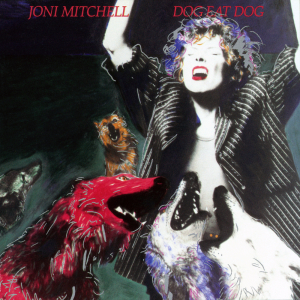Most of the album deals with global and political concerns, which caused more controversy than the fact that “Good Friends”, the love song that opens the album, is sung as a duet with Michael McDonald. “Fiction” would be a decent synth-pop track if she wasn’t singing on it, and while the lyric makes some points, it’s more list than poetry. The message of “Three Great Stimulants” is more successful, with a more palatable accompaniment. “Tax Free” attacks televangelists, a few years before a bunch of them met scandal, but using Rod Steiger to give voice to the “men of God” is a little heavy-handed. “Smokin’ (Empty, Try Another)” is literally built around the sound of a cigarette machine—cute, but somewhat deflates her own preaching.
The title track brings all her gripes together, equating evangelists with “big wig financiers”, not exactly popular opinions under Reaganomics. Given the instrumentation and interjected effects, it’s hard to tell if she’s trying to emulate the lifestyle of “Shiny Toys” or lampooning it. It’s soon forgotten however, with “Ethiopia”, easily the highlight of the album, sticking mostly to piano with little in the way of production gimmicks, and a powerful commentary on what was one of the news events of the year. The subject of “Impossible Dreamer” isn’t clear until she includes “Give Peace A Chance”, but it’s more impressionistic than direct. She ends back where she started, with the straight-ahead romance of “Lucky Girl”, thankfully without Michael McDonald.
We’ve given Joni the benefit of the doubt thus far, but Dog Eat Dog misses the mark as an album. It still has its fans; even lifelong Joni fanatic Prince would have enjoyed some of the modulations here. But the key word there is “some”.
Joni Mitchell Dog Eat Dog (1985)—2½

No comments:
Post a Comment